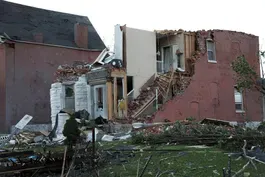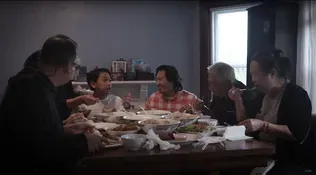
Trump’s escalating feud with Harvard affects cancer research
Clip: 5/17/2025 | 4m 39sVideo has Closed Captions
Trump administration’s escalating feud with Harvard affects breast cancer research
The Trump administration's feud with major American universities escalated this week as a federal antisemitism task force notified Harvard that $450 million of the school’s research grants are being cut. That’s on top of the $2.2 billion it had previously frozen. Laura Barrón-López spoke with one of the affected researchers, Joan Brugge, director of Harvard’s Ludwig Cancer Center.
Problems playing video? | Closed Captioning Feedback
Problems playing video? | Closed Captioning Feedback
Major corporate funding for the PBS News Hour is provided by BDO, BNSF, Consumer Cellular, American Cruise Lines, and Raymond James. Funding for the PBS NewsHour Weekend is provided by...

Trump’s escalating feud with Harvard affects cancer research
Clip: 5/17/2025 | 4m 39sVideo has Closed Captions
The Trump administration's feud with major American universities escalated this week as a federal antisemitism task force notified Harvard that $450 million of the school’s research grants are being cut. That’s on top of the $2.2 billion it had previously frozen. Laura Barrón-López spoke with one of the affected researchers, Joan Brugge, director of Harvard’s Ludwig Cancer Center.
Problems playing video? | Closed Captioning Feedback
How to Watch PBS News Hour
PBS News Hour is available to stream on pbs.org and the free PBS App, available on iPhone, Apple TV, Android TV, Android smartphones, Amazon Fire TV, Amazon Fire Tablet, Roku, Samsung Smart TV, and Vizio.
Providing Support for PBS.org
Learn Moreabout PBS online sponsorshipJOHN YANG: The Trump administration's feud with major American universities escalated this week.
The federal antisemitism task force notified Harvard that $450 million of the school's research grants are being cut, and that's on top of the $2.2 billion that had previously frozen.
Laura Barron-Lopez spoke with one of the affected researchers, Joan Brugge, the director of Harvard's Ludwig Cancer Center.
LAURA BARRON-LOPEZ: Dr. Brugge, you've been working for years on breast cancer research.
Tell me, what type of research exactly are you doing and the type of progress that you've made?
DR. JOAN BRUGGE, Director, Harvard Ludwig Cancer Center: In my lab, the ultimate goal of our research efforts is to find better ways to detect and destroy cancer in its tracks.
And the breast cancer research project that is funded by a National Cancer Institute grant that is currently frozen specifically aims to identify and profile the earliest precursors or harbingers of breast cancer before these precursors become cancer.
The goal then is to develop methods to detect these early precursors and then design treatments that prevent them from becoming cancer.
LAURA BARRON-LOPEZ: So that means, say if someone had one of those, what's known as a BRCA gene, that you could help stop that in its tracks?
JOAN BRUGGE: Yes, this would allow us to monitor the development of or the expansion of these early precursors.
And even before we had treatments for them, we could be able to tell when they're starting to expand.
And that would be a real cue, that would be the cue for those women to have the prophylactic breast cancer mastectomies.
LAURA BARRON-LOPEZ: How important ultimately are federal grants in the work that you do?
JOAN BRUGGE: I would say federal grants are the most important contributors to our research effort.
There just isn't enough money from foundations or partnerships with companies that, to cover the amount of research that is -- that there's opportunities to pursue with termination of, say, for instance, the grant to our lab.
We would have to -- we'd have to -- we wouldn't have the money to fund salaries for the postdoctoral fellows or trainees and research scientists that are doing the work.
We lose the money necessary to buy supplies for these studies and to pay for the technologies.
And this would severely impede progress towards our goal.
Especially when we're so close, we've actually identified these cells that we think are the earliest precursors of cancer.
We wouldn't be able to develop the methods so that this work would have impact in the community.
I never imagined that there would be across the board cut in research that could have such important implications for the general well-being of the United States.
LAURA BARRON-LOPEZ: If research like yours is ultimately cut off, what effect would it have on everyday Americans and the work that you and others do at Harvard?
JOAN BRUGGE: There would be a really significant delay advancing all of the research findings that we've made to date.
And so this would slow down the development of therapies, depending on how long and how broadly these cuts are applied.
But there are a lot of other consequences.
Like the reduction in research funding would reduce the pipeline of disease impacting discoveries from U.S. academic institutions to pharmaceutical companies that then translate the discoveries into treatments and cures for diseases.
So industry relies on these discoveries.
We would also lose our competitive edge and leadership in the world.
Laboratories in other countries would have a significant competitive edge if the discoveries are made outside the United States.
There's also obviously economic implications not only from the loss of revenue from the treatments, but also from the enormous research income that comes to companies who generate the reagents, supplies and services for academic research.
And a major concern is that we're going to lose our best and brightest scientific investigators, the young trainees, to other countries.
Some people aren't going to want to pursue careers in biomedicine with this uncertainty in research funding.
LAURA BARRON-LOPEZ: Dr. Joan Brugge, thank you for your time.
JOAN BRUGGE: You're welcome.
Thank you.
JOHN YANG: Late this week, the government terminated the grant sustaining Brugge's work.
Harvard searching for alternate funding.
The largely forgotten history of Philadelphia’s MOVE bombing
Video has Closed Captions
Clip: 5/17/2025 | 6m 40s | The largely forgotten history of Philadelphia’s police bombing of Black organization MOVE (6m 40s)
News Wrap: Deadly storms rip through Kentucky and Missouri
Video has Closed Captions
Clip: 5/17/2025 | 3m | News Wrap: Deadly storms rip through Kentucky and Missouri (3m)
Tracing one Hmong family’s journey from Laos to Rhode Island
Video has Closed Captions
Clip: 5/17/2025 | 4m 33s | Tracing one Hmong family’s journey from Laos to Rhode Island (4m 33s)
Why Israel is mobilizing a new ground assault on Gaza
Video has Closed Captions
Clip: 5/17/2025 | 4m 42s | Israel mobilizes new ground assault on Gaza to pressure Hamas into freeing hostages (4m 42s)
Providing Support for PBS.org
Learn Moreabout PBS online sponsorshipSupport for PBS provided by:
Major corporate funding for the PBS News Hour is provided by BDO, BNSF, Consumer Cellular, American Cruise Lines, and Raymond James. Funding for the PBS NewsHour Weekend is provided by...















